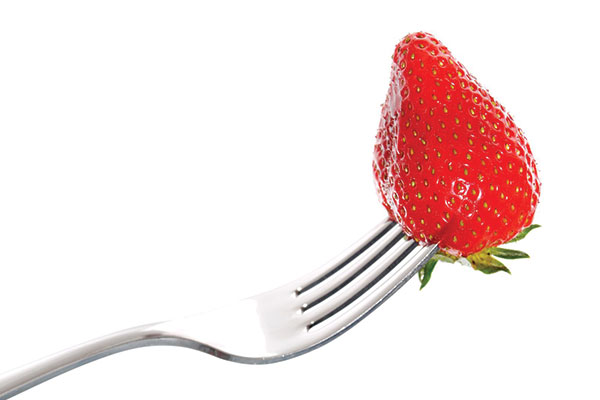Beating Cancer One Bite at a Time
Tips for Getting the Nutrition You Need during Cancer Treatment
by Gina DeAngelo, RD, CSO, LDN
Being diagnosed with cancer can be overwhelming and scary. You probably feel as if many things are out of your control. However, an important part of your cancer care is in your control – and that’s nutrition. Good nutrition not only can help you feel better, but it may also help your treatments work better.
There is one catch, though. For many cancer survivors, certain treatment-related side effects can make it difficult to get the nutrition you need. But don’t lose heart. There are things you can do to combat these side effects and improve your nutrition status. Keep reading for tips on overcoming some of the most common barriers to good nutrition during cancer treatment.
Loss of Appetite
While undergoing cancer treatment, it’s important for survivors to keep a healthy weight. Depending on your situation, you may have to work to avoid weight loss or weight gain.
Many people receiving cancer treatment experience a decrease in appetite, or they may become full quickly when eating. To make sure you’re getting enough nutrients when your appetite is low, try eating smaller, more frequent meals throughout the day. Smaller meals are often easier to handle than three large meals. In addition, choosing foods that are higher in calories may help you meet your nutrient needs without feeling overly full. Nutrition supplements – whether in the form of a meal replacement shake or a supplement powder added to a homemade smoothie – can also help when a lack of appetite is keeping you from eating. Just be sure to discuss any supplements you are thinking about taking with your dietitian or your doctor to make sure that these supplements do not interfere with your cancer treatments.
To make sure you’re getting enough nutrients when your appetite is low, try eating smaller, more frequent meals throughout the day.
Nausea and Vomiting
Nausea and vomiting are common side effects of many types of chemotherapy. Your doctor can prescribe anti-nausea medications to help quell the queasiness. Ask your doctor for specific instructions on how and when to take them. (Usually, taking these medications 30 to 60 minutes prior to eating is most effective).
Just like with a low appetite, smaller meals throughout the day are often easier to tolerate than three large meals when dealing with nausea. A goal of five to six small meals per day should be enough to meet your calorie and protein needs. To keep nausea and vomiting at bay, opt for bland foods rather than high-fat, spicy, or acidic foods. Dry or salty foods are typically the most palatable and can help ease feelings of nausea. Ginger and peppermint can also be effective at suppressing nausea.
Diarrhea and Constipation
Some people may experience changes in bowel habits when undergoing cancer treatment. Some treatments can cause diarrhea, while others cause constipation.
If diarrhea occurs, try eating bananas, rice, applesauce, and toast. (This is often referred to as the BRAT diet.) These foods can cause your stools to have more consistency. Eating high-fiber foods (such as fresh fruits and vegetables) can also bulk up your stools. Try to avoid high-fat and spicy foods, as these can cause further stomach irritation. Additionally, staying hydrated is extremely important – it is easy to become dehydrated with diarrhea! Go for beverages that are palatable and easy to tolerate, and consider sports drinks to replace lost electrolytes.
Should I See a Dietitian?
Just as all cancers are different, nutrition recommendations vary as well. A registered dietitian can help you set a calorie goal and come up with a dietary plan to meet your nutritional needs. Dietitians can also help you manage any treatment-related side effects that may hinder your ability to eat well and get the nutrition you need. Ask your doctor for recommendations of registered dietitians in your area.
Adequate hydration is also important when dealing with constipation. Warm liquids can help stimulate the bowels – try hot tea, coffee, or warm prune juice. It’s also good to eat foods that are higher in fiber. Try adding fresh fruits and vegetables to each meal. You should also try to stay active. Our bowels are stimulated when we exercise or are physically active, and this can help to get them going. Talk to your doctor or a physical therapist to find out what activities are safe (and which to avoid) during treatment.
Mouth Sores
For people who develop mouth sores during treatment, eating may become difficult and painful. Try eating soft, moist foods that are high in calories and protein. That way, if you’re only able to eat a little, you’ll increase your chances of getting adequate nutrients. Creamy soups, scrambled eggs, yogurt, and macaroni and cheese are examples of some easy to chew and swallow foods you may want to try.
If you have mouth sores, you should avoid spicy, acidic, and hard foods, as these can cause more pain and discomfort.
Oral nutritional supplements or homemade smoothies or milkshakes can also help you get the nutrition you need while being gentler on your mouth. Many food items may be better tolerated when added to shakes or smoothies, so think outside of the box when creating your own. If you have mouth sores, you should avoid spicy, acidic, and hard foods, as these can cause more pain and discomfort.
Fatigue
Many people experience fatigue while undergoing treatment. But did you know that fatigue can affect your ability to get good nutrition? For some people, cancer-related fatigue can make them too tired to eat.
If you’re feeling too tired to eat a large meal, consider eating smaller, more frequent meals throughout the day. In addition, consuming high-calorie items will help you meet your calorie requirements while reducing the amount of food you need to eat, and, thus, the amount of time and energy you spend eating. Also, beverages may be easier to consume than solid foods when you are fatigued, so milkshakes, smoothies, nutrition supplements, and other liquids that contain calories (such as juices, sports drinks, and popsicles) can help you meet your nutrition goals. As a bonus, food gives your energy, so eating may help to ease your fatigue as well.
The Takeaway
Nutrition is an important part of your treatment plan that should not be ignored. If you are having difficulty eating, do not hesitate to speak with your doctor or a registered dietitian. Your healthcare team is there to support you through treatment – and that includes helping you get the nutrition you need to beat cancer.

Gina DeAngelo is a Registered Dietitian and Certified Specialist in Oncology at Moffitt Cancer Center in Tampa, FL. She specializes in stem cell transplants and works with people undergoing CAR-T clinical trials.
This article was published in Coping® with Cancer magazine, November/December 2017.


